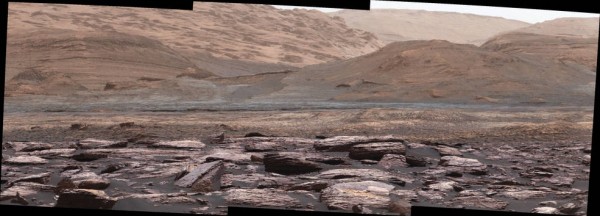By Ana Verayo, | December 15, 2016

The foreground of this scene from the Mastcam on NASA's Curiosity Mars rover shows purple-hued rocks near the rover's late-2016 location. (NASA/JPL-Caltech/MSSS)
New data collected by NASA's Curiosity rover on Mars has revealed that the alien world is filled with organics.
The main goal of NASA's Martian rover is to uncover crucial evidence of potential life on the Red Planet and to determine whether Martian environment is suitable for organic life and human colonization.
Like Us on Facebook
For years, scientists have strongly believed that there is strong evidence of life on Mars and now, NASA's Curiosity rover has confirmed this with the latest data of organic materials on the dusty world.
According to biogeochemist and geologist, Jennifer Eigenbrode from NASA's Goddard Space Flight Center, the presence of organics on Mars is pretty much all over the planet. She revealed this during a National Academy of Sciences workshop.
"They are all over the surface and are probably embedded into the rock record, as we would have never said this four years ago. This means that we still have a lot to study and research about the Red Planet, and we must continue to do so," Eigenbrode explained.
By drilling rock samples, the rover obtained organic readings which are pivotal in the search for past life on Mars and provide potential resources for future manned missions. Eigenbrode explained that this organic matter could open more doors to determine the potential of creating a habitation on Mars.
In support of this, geologist John Grotzinger from Caltech (California Institute of Technology), also expressed his enthusiasm about the possibility that the otherwise arid planet is habitable and is filled with organic material that can one day sustain life for humans.
"This new data is telling us that the sedimentary basin of Mars is apparently a chemical reactor where primary igneous minerals are being transformed into different chemicals and different minerals in the process. Currently, we do not know what this means, but this is an exciting opportunity for habitability," Grotzinger explained.
The new findings of NASA's Mars Curiosity rover were presented at the American Geophysical Union conference this week.
-
Use of Coronavirus Pandemic Drones Raises Privacy Concerns: Drones Spread Fear, Local Officials Say

-
Coronavirus Hampers The Delivery Of Lockheed Martin F-35 Stealth Fighters For 2020

-
Instagram Speeds Up Plans to Add Account Memorialization Feature Due to COVID-19 Deaths

-
NASA: Perseverance Plans to Bring 'Mars Rock' to Earth in 2031

-
600 Dead And 3,000 In The Hospital as Iranians Believed Drinking High-Concentrations of Alcohol Can Cure The Coronavirus

-
600 Dead And 3,000 In The Hospital as Iranians Believed Drinking High-Concentrations of Alcohol Can Cure The Coronavirus

-
COVID-19: Doctors, Nurses Use Virtual Reality to Learn New Skills in Treating Coronavirus Patients







